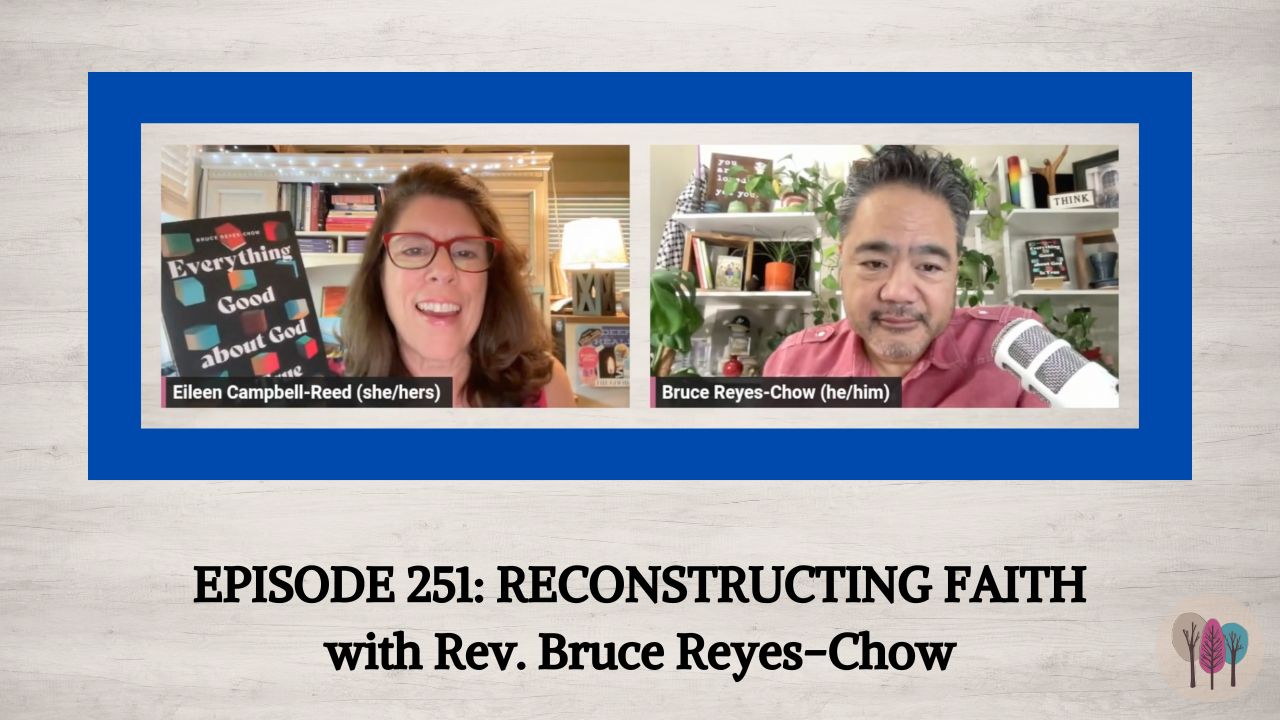Every generation must figure out how to work out their need for deconstructing and reconstructing faith. This spiritual and theological work feels at once exciting and urgent, and also risk-filled and terrifying. It isn’t merely an intellectual exercise, deconstructing faith is also relational, emotional, and embodied work.
When I was in college and seminary, I was challenged almost daily by what I read, what my professors taught me, by the conversations in my classes, and outside them also. Basically, every other student around me, and my husband (slightly against his will as a non-seminarian) was deconstructing our inherited faith.
I remember laying in bed one Saturday morning (the only time we would hang around in bed that late after the sun was up). I had long since given up believing in a literal hell. But I still had not quite let go of the space we called heaven. Giving up belief in hell was easy. A relief. Hell was real on earth and made by humans. See: war, sexual abuse and rape, genocide, crushing poverty, apartheid. On and on the list of human evils went. We did not need an eternal and literal version of evil. No additional need for hell.
But giving up heaven? It felt like accepting despair. No place was left for those who were dying and leaving the breathing, heart-beating, walking-around life. In that moment on a Saturday morning I cried and cried. I was grieving heaven.
Reconstructing Faith
Already new ideas were beginning to emerge. The scientific, embodied reality of dying and death were solid. I didn’t need ghosts or paranormal activity to explain death in the absence of heaven.
As I encountered multiple deaths in my own extended family, and took a unit of Clinical Pastoral Education (CPE), I also came to understand how for many people heaven would remain an important comfort measure. Just because I did not need a literal, eternal place to keep my faith afloat, did not mean i needed to force my newly deconstructed faith on anyone else.
Over the years after my moment of grief over heaven, I performed many funerals, I sat at bedsides when precious souls took their last breath, and I lost more family members and friends to death. With time I continued to reconstruct my understandings of life and death and heaven.
I came to see how heaven is a utopian vision of how a good and perfected world might look. And I learned the power of future stories, along with better understandings of the past, to change the here and now. Visions of heaven in the Bible and other Christian texts served many purposes. They engendered hope. Inspired courage and risk for change, and gave people power to resist.
Heaven also offers a psychological and spiritual placeholder for their losses and griefs. If all the people, pets, unborn children, and saints from the ages have one glorious place to be, then the living can feel less afraid of their own impending death. Heaven becomes a place to honor all that has been lost. It need not be literal to serve these functions. It continues to be a psychological placeholder and utopian vision, boltering courage and empowerment to many Christians.
More Deconstructions and Reconstructions
Every other dimension of my spiritual and theological life and faith has received an overhaul. Heaven is one of the easier (or briefer) elements to write about. Most of my deconstructions began in youth ministry when I was encouraged to question my faith. These continued intensely in college and seminary.
I told my students this term, it was like I got a box of hammers in seminary. Intellectual tools to deconstruct every aspect of my theology, spirituality, and faith. This was not intimidating to me. It was fun most of the time. And I went around smashing everything. I truly believed in doubt as a way of faith (still do). And I was in communities where doubt and questions were welcome and expected. It didn’t hurt the cause of our faith deconstructions that most of my friends were also leaving the Southern Baptist Convention at the time.
But when I got to my first call, I found myself standing up to pray in worship, preach some Sundays, and teach youth and children. I needed to start putting the smashed pieces of my faith back together if I was to lead them effectively. I tried to keep the questions, name the doubts, and hold the tensions of faith in all I said and did.
The newly reconstructing faith was messy, but honest. It captured the downsides and dangers, losses and laments of life. Over the years I’ve attempted to continue on in this direction of deconstructing and reconstructing or reframing. My faith never felt weak or lesser. It felt sturdier and stronger for all the dismantling and remaking.
Bruce Reyes-Chow on Reconstructing Faith
In my recent conversation with Rev. Bruce Reyes-Chow we talked more about his new book, Everything Good about God is True. I asked Bruce if he had in mind the people of our current generation, who are deconstructing their faith in mind when he wrote. Here is what he told me.
If you are in a time of deconstructing and/or reconstructing your faith and spiritual life, I hope you will find encouragement in my interview with Bruce and in his new book!




